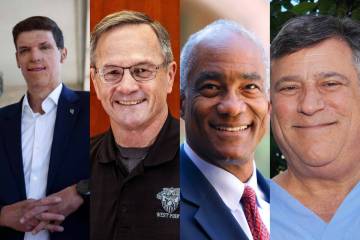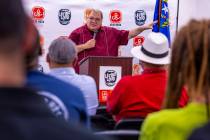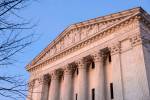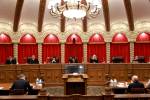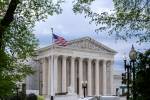Supreme Court rules on concealed guns, church rights
WASHINGTON — The Supreme Court is rejecting yet another call to decide whether Americans have a constitutional right to carry guns with them outside their homes.
The justices on Monday left in place an appeals court ruling that upheld the San Diego sheriff’s strict limits on issuing permits for concealed weapons.
The high court decided in 2008 that the Constitution guarantees the right to a gun, at least for self-defense at home.
But the justices have refused repeated pleas to spell out the extent of gun rights in the United States, allowing permit restrictions and assault weapons bans to remain in effect in some cities and states.
More than 40 states already broadly allow gun owners to be armed in public.
Justices Clarence Thomas and Neil Gorsuch said the court should have reviewed the appellate ruling. Thomas said the decision not to hear the case “reflects a distressing trend: the treatment of the Second Amendment as a disfavored right.”
The high court also turned away a second case involving guns and the federal law that bars people convicted of crimes from owning guns.
The Trump administration had urged the court to review an appellate ruling that restored the rights of two men who had been convicted of non-violent crimes to own guns.
The federal appeals court in Philadelphia ruled for the two men. The crimes were classified as misdemeanors, which typically are less serious, but carried potential prison sentences of more than a year. Such prison terms typically are for felonies, more serious crimes.
Justices Ruth Bader Ginsburg and Sonia Sotomayor said they would have heard the administration’s appeal.
Church win
Churches have the same right as other charitable groups to seek state money for new playground surfaces and other non-religious needs, the court ruled.
By a 7-2 vote, the justices sided with Trinity Lutheran Church of Columbia, Missouri, which had sought a grant to put a soft surface on its preschool playground. The church was denied any money even though its application was ranked fifth out of 44 submissions.
Chief Justice John Roberts said for the court that the state violated the First Amendment by denying a public benefit to an otherwise eligible recipient solely on account of its religious status. He called it “odious to our Constitution” to exclude the church from the grant program, even though the consequences are only “a few extra scraped knees.”
The case arose from an application the church submitted in 2012 to take part in Missouri’s scrap tire grant program, which reimburses the cost of installing a rubberized playground surface made from recycled tires. The money comes from a fee paid by anyone who buys a new tire. The church’s application to resurface the playground for its preschool and daycare ranked fifth out of 44 applicants.
But the state’s Department of Natural Resources rejected the application, pointing to the part of the state constitution that says “no money shall ever be taken from the public treasury, directly or indirectly, in aid of any church, sect or denomination of religion.”
A recycled scrap tire is not religious, the church said in its Supreme Court brief. “It is wholly secular,” the church said.
In dissent, Justice Sonya Sotomayor said the ruling weakens the nation’s longstanding commitment to separation of church and state.
“This case is about nothing less than the relationship between religious institutions and the civil government — that is, between church and state,” she said, joined by Justice Ruth Bader Ginsburg. “The Court today profoundly changes that relationship by holding, for the first time, that the Constitution requires the government to provide public funds directly to a church.”
Arkansas birth certificates
The court overturned a state court ruling that allowed Arkansas to refuse to list both same-sex spouses on birth certificates, a decision that helps clarify the scope of protections provided by the high court’s landmark 2015 decision legalizing gay marriage.
The justices ruled in favor of lesbian couples by throwing out a December ruling by the Arkansas Supreme Court decision that upheld state officials’ refusal to name the wives of the birth mothers as parents on birth certificates.
The Arkansas court said state officials do not have to list both same-sex spouses as named parents on birth certificates, even though state law allows a birth mother’s opposite-sex husband to be listed when the baby is not biologically related to him. Both couples received the birth certificates they wanted when they won in trial court.
Conservative Justices Neil Gorsuch, Samuel Alito and Clarence Thomas dissented, saying the lower court decision should not have been reversed.
Two gay married couples who live in Arkansas, Marisa and Terrah Pavan and Leigh and Jana Jacobs, were turned down by the Arkansas Department of Health to include both parents’ names on their babies’ birth certificates. In each case, only the birth parent was listed on the certificate.
Both couples sued in state court, and a trial judge ruled that the U.S. Supreme Court’s 2015 Obergefell v. Hodges decision legalizing gay marriage nationwide required that the same-sex spouses be named on the birth certificates.
Whistleblower protection
The court agreed on Monday to consider whether corporate insiders who blow the whistle on their employers are shielded from retaliation if they only report alleged misconduct internally rather than to the government’s Securities and Exchange Commission.
The justices will hear Digital Realty Trust Inc.’s appeal of a lower court ruling in favor of Paul Somers, an executive fired by the San Francisco-based company after he complained internally about alleged misconduct by his supervisor but never reported the matter to the U.S. Securities and Exchange Commission.
The case hinges on the SEC’s whistleblower protection rules required by the 2010 Dodd-Frank Wall Street reform law.
The court agreed to take up the case on the last day of a nine-month session. The court will hear the case during the next term that starts in October.
If the Supreme Court ultimately sides with the company, then it would force corporate whistleblowers to report wrongdoing to the SEC in order to be protected from retaliation.
No Kennedy retirement announcement
The last day of the Supreme Court’s term was notable not only for what was announced but also for what wasn’t.
There had been speculation that Supreme Court Justice Anthony Kennedy could reveal his retirement from the court Monday. But the court recessed without any announcement. Kennedy could still announce his retirement at any time, though the last day of the term was seen as an opportune moment.
Kennedy had given no public sign that he would step down this year and give President Donald Trump his second high court pick.
But Kennedy turns 81 next month and has been on the court for nearly 30 years. Several of his former law clerks have said they think he is contemplating stepping down in the next year or so. In addition, Kennedy and his clerks gathered over the weekend for a reunion pushed up a year earlier than normal. The decision to hold an early reunion helped spark talk he might be leaving the court.







